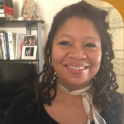
My first interreligious experiences took place in the Kingdom of Saudi Arabia where I grew up as a expatriate kid. When my father took a job as a technical instructor for the Royal Saudi Navy, we relocated to the Kingdom in the early ‘80s. Interreligious experiences were woven into expat life at every turn.
All expats were expected to abide by certain Muslim customs when outside of their homes. As a young girl, I covered my body modestly by wearing an abaya (long, flowing black cape) when in the public. During Ramadan, we were not to be seen eating in public during the daily fasts. I have memories of hiding in the car when I wanted to have a snack on the way home after school. During prayer hours, the shops closed and we had to find some way to occupy ourselves while waiting. The prayer calls served as time markers for my activities throughout the day. I greatly enjoyed waking up to the calming, bellowing sounds of the muezzin (official callers to prayer).
My childhood life in Saudi Arabia provided me with a foundation for religious tolerance and understanding. Adapting to local customs and respecting the religious traditions of others became second nature to me. With that said, the Muslim culture that I came to know was not always in line with my beliefs and values.
In particular, I took issue with the way in which men were designated guardians of all of the women in their nuclear and extended families. In the early ‘80s in Saudi Arabia, women could not drive and had to sit in separate sections of buses, restaurants, and hospitals. Later on in my educational journey, I came to understand that Saudi Arabia’s interpretation of Islam was rooted in the Wahhabist movement. In other words, the Kingdom had its own notions of pure Islam and of how to interpret Quranic texts with regards to societal norms.
My experiences led me to become curious about societal norms in other Muslim countries. As a result, I sought out opportunities to spend time in other Muslim countries such as Senegal, Egypt, and Morocco and observed many variances in the dress codes and customs.
For my fellowship project, I am designing a unit for my middle school French students on the banning of the hijab for French athletes during the Paris Olympics 2024. The unit will introduce students to the history of the ban on religious symbols and outerwear in government space and buildings in France. Students will then be exposed to authentic resources (such as news headlines) related to the issue. Students will then participate in an informed dialogue on the issues around the ban on head coverings. The topic seems more relevant than ever when discussing French society.
As an ICJS fellow, I have enjoyed discussing the norms and practices of Islam, Christianity, and Judaism more deeply. Our discussion about The Pluralism Project at Harvard University and our viewing of Harvard X’s video, World Religions Through their Scriptures, were highly impactful for me. Through this work, I learned about the importance of teaching about the diversity of religious practices within each faith rather than treating each religion as a monolith. I look forward to continuing this work next year and beyond.
 Rona Mattocks teaches at Calvert School and was a 2023-2024 ICJS Teachers Fellow. Learn more about the ICJS programs for teachers here.
Rona Mattocks teaches at Calvert School and was a 2023-2024 ICJS Teachers Fellow. Learn more about the ICJS programs for teachers here.
Opinions expressed in blog posts by the ICJS Teacher Fellows are solely the author’s. ICJS welcomes a diversity of opinions and perspectives.